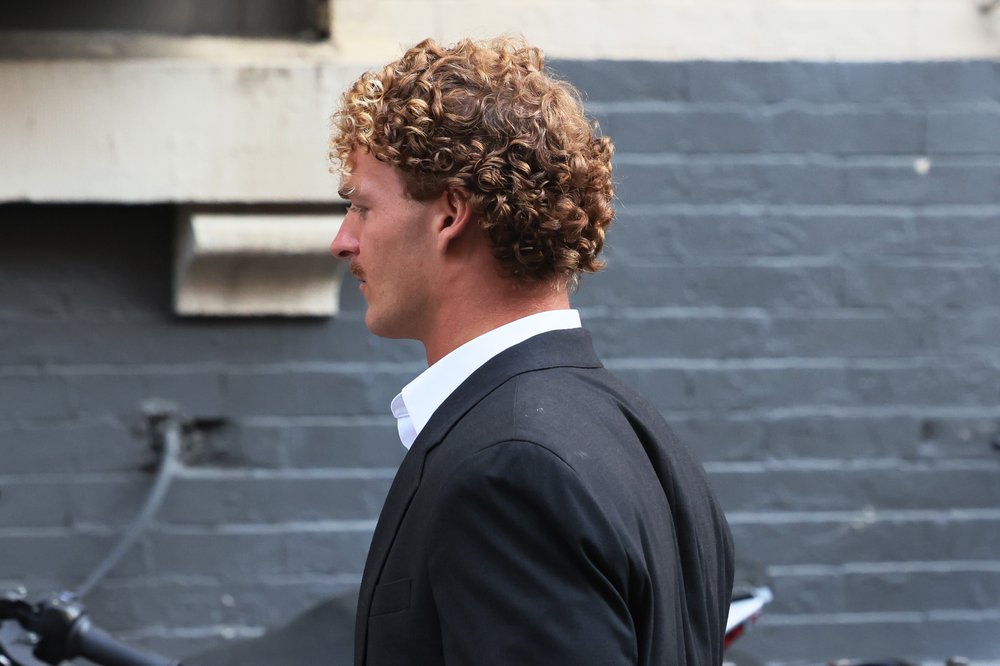Jury will hear what Daniel Penny told NYPD after fatally choking Jordan Neely in subway
Oct. 4, 2024, 4:48 p.m.
Penny's trial is set to begin later this month in Manhattan.

A New York City jury will likely hear statements a man made to police after he fatally choked a homeless man on the subway last year, a judge ruled on Friday afternoon.
Daniel Penny told police that Jordan Neely was “going crazy” and that he put Neely “in a choke” because Neely “was threatening everybody,” according to court records.
“I had him pretty good,” Penny told an officer at the Broadway-Lafayette Street station, records show. “I was in the Marine Corps.”
Penny is facing manslaughter and criminally negligent homicide charges for choking Jordan Neely on the F train last year. He doesn’t deny that he wrapped his arms around Neely’s neck, and says he was trying to protect fellow subway riders because Neely was scaring people. Penny has pleaded not guilty to the charges.
A video of Penny holding Neely on the floor of the subway went viral at a time when concerns about subway safety, homelessness and mental illness were top of mind for many New Yorkers.
Police spoke with Penny at the subway station and the local precinct that day, but let him go home afterward. Protesters flooded subway platforms — with some even jumping onto the tracks — and urged Manhattan District Attorney Alvin Bragg to bring criminal charges. Penny was arrested more than a week later.
The case became a kind of Rorschach test, as some praised what they said was Penny’s bravery and donated to his multimillion-dollar legal defense fund, while others decried him as an overzealous vigilante.
Neely was once a well-known Michael Jackson impersonator who performed regularly on the subway. He also cycled in and out of psychiatric treatment, used synthetic cannabinoids and was diagnosed with schizophrenia, according to court records.
As Penny’s late October trial date approaches, both the prosecution and defense teams have asked a judge to block pieces of evidence from the jury, arguing that permitting them could hurt their respective versions of the case.
At a hearing on Thursday, defense attorneys asked a judge to preclude the statements Penny made to police after he choked Neely. They played a video compilation from officers’ body-worn cameras, which showed Penny demonstrating to police how he had held Neely and telling them Neely was “squirming” as he tried to hold him down.
“I’m not trying to kill the guy. I’m just trying to deescalate the situation,” Penny said. “I wasn’t trying to injure him. I was trying to keep him from hurting anyone else.”
Penny’s attorneys argued that the statements he made at the subway station and precinct shouldn’t be used, because police didn’t follow proper protocols before asking Penny questions. But Justice Maxwell Wiley ruled that police did follow the rules, including advising Penny of his right to remain silent before interviewing him at the station. That means anything he said can be used in court, Wiley ruled.
Penny’s attorneys did not immediately respond to a request for comment on Friday afternoon. A spokesperson for the Manhattan district attorney’s office declined to comment.
Prosecutors also asked the judge on Thursday to preclude some evidence from the trial. They don’t want Penny’s defense attorneys to reference more than 6,000 pages of Neely’s psychiatric records, which they say include information about his family history, past surgeries, notes about his participation in group therapy sessions and information about past “bad acts,” according to court papers.
“The only reason to do so is to influence the jury to devalue Mr. Neely’s life,” Assistant District Attorney Dafna Yoran wrote in a motion.
The DA’s office has also asked the judge to bar Penny’s attorneys from calling a psychiatric witness to opine on Neely’s psychiatric history and use of synthetic cannabinoids, also known as K2, because prosecutors say he’s not qualified to speak about Neely’s cause of death. Wiley is expected to rule on that request next week.
This story and has been updated with additional information about the case. Catalina Gonella contributed reporting.
Pretrial hearing begins in NYC subway chokehold case